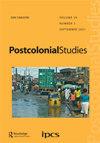Beyond belief: secularism, religion and our muddled modernity
IF 1.8
3区 社会学
Q2 CULTURAL STUDIES
引用次数: 0
Abstract
This article argues that the very idea of religion, as the genus of which the various ‘ world religions ’ are the species, is a modern invention, and thus comparisons between religions – including those pertaining to their capacity to recognize and adapt to the necessary distinction between matters of religion and matters properly belonging to secular society and the state – rest upon a deep conceptual error. Religion is made or produced, it goes on to show, in part by the interventions of the state; the claim that secularism is the process by which politics and religion come to be ‘ separated out ’ is therefore untenable. It concludes by asking how we might understand religion and secularism in the light of this, if it is no longer possible to understand them in the conventional way; and also what the implications of such alternative understandings might be for the narrative of modernity of which the secularization thesis is a part.超越信仰:世俗主义、宗教和我们混乱的现代性
本文章由计算机程序翻译,如有差异,请以英文原文为准。
求助全文
约1分钟内获得全文
求助全文

 求助内容:
求助内容: 应助结果提醒方式:
应助结果提醒方式:


